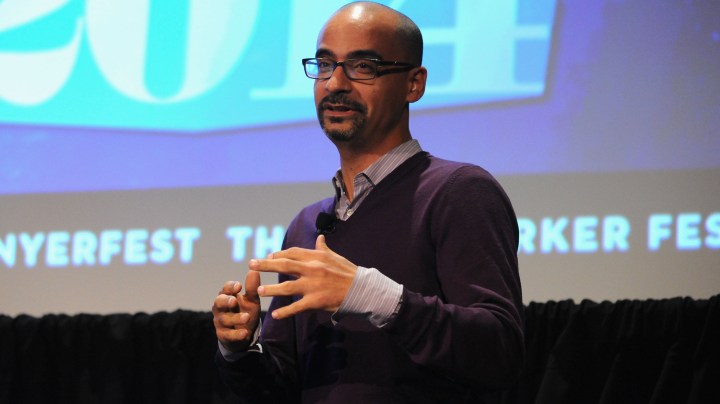Junot Díaz’s Accusers Respond After the Author Denies Misconduct

Writer Junot Diaz attends the Jersey Boys: David Chase, Junot Diaz, And Sam Lipsyte Moderated By David Remnick during The New Yorker Festival 2014 on October 10, 2014 in New York City. Photo by Andrew Toth/ Getty Images Entertainment
Two months after several women accused Junot Díaz of sexual misconduct and misogynistic behavior, the author has come out to deny the allegations. On Monday, the Dominican writer told The Boston Globe that he was shocked about the accusations leveled at him. “I was like, ‘Yo, this doesn’t sound like anything that’s in my life, anything that’s me,” he said in his first interview since Zinzi Clemmons alleged that he cornered and forcibly kissed her. As Junot defends himself, the women who spoke out against him are criticizing the way the Globe covered the story, illustrating that abuse of power comes in many forms, and once again talking about the author’s inappropriate conduct.
Not long after Díaz revealed in a piece in The New Yorker that someone he trusted sexually abused him as a child, Clemmons confronted him at the Sydney Writers’ Festival in Australia to ask him about an incident that took place six years ago. She then went on to Twitter to further elaborate. “As a student, I invited Junot Díaz to a workshop on issues of representation in literature,” she wrote. “I was an unknown wide-eyed 26 yo, and he used it as an opportunity to corner and forcibly kiss me. I’m far from the only he’s done this 2, I refuse to be silent anymore.”
She followed it up with a few more tweets, explaining she has emails to back up her claims and that she has since avoided literary functions where she could run into Junot. Authors Alisa Rivera, Carmen Maria Machado, and Monica Byrne then came forward with their own stories about Díaz’s alleged problematic behavior. Their words surprised many. Some used his work – which is rife with misogyny – as proof of his guilt. Still, others speculated that The New Yorker essay served as a calculated attempt to get ahead of more allegations.
Initially, Díaz offered a vague apology. “I take responsibility for my past,” the statement read. “That is the reason I made the decision to tell the truth of my rape and its damaging aftermath. This conversation is important and must continue. . . . We must continue to teach all men about consent and boundaries.”
The accusations came in the midst of the #MeToo and Time’s Up movements, which have brought attention to the ways that powerful people have abused their positions and preyed on others. And while men like Harvey Weinstein have been brought down by the brave people who have shared their experiences, Junot has remained relatively unscathed. Both MIT and the Boston Review will continue working with the author. A group of female professors also came to his defense in an open letter.
And now in this new interview, Díaz denied any wrongdoing and, essentially, took back the apology. “I’ve written a lot of crap in my life,” he said. “One does when one’s a writer. But, definitely, that statement is the worst thing I’ve written, the worst thing I’ve put my name to. Boy, I wish I’d had the presence of mind to rewrite the damn thing… I did not kiss anyone. I did not forcibly kiss Zinzi Clemmons. I did not kiss Zinzi Clemmons. It didn’t happen.”
Junot came prepared to The Boston Globe interview with names of people who could speak to his character and an email from Zinzi after said encounter. But the women are once again bringing to light their experiences. After the Globe‘s piece was published, Zinzi called Stephanie Ebbert, one of the authors of the piece, “unprofessional and clearly biased.”
In a series of tweets, Rivera – who said Junot told her she needs “to spend more time in the sun and darken up” if she wants to be considered Latina before he allegedly pulled her onto his lap – reiterated that he did force her onto his lap without her consent.
In a twitter thread, Monica Byrne criticized the Globe for making the women have to explain themselves and for attempting to cast doubt on the validity of their stories.